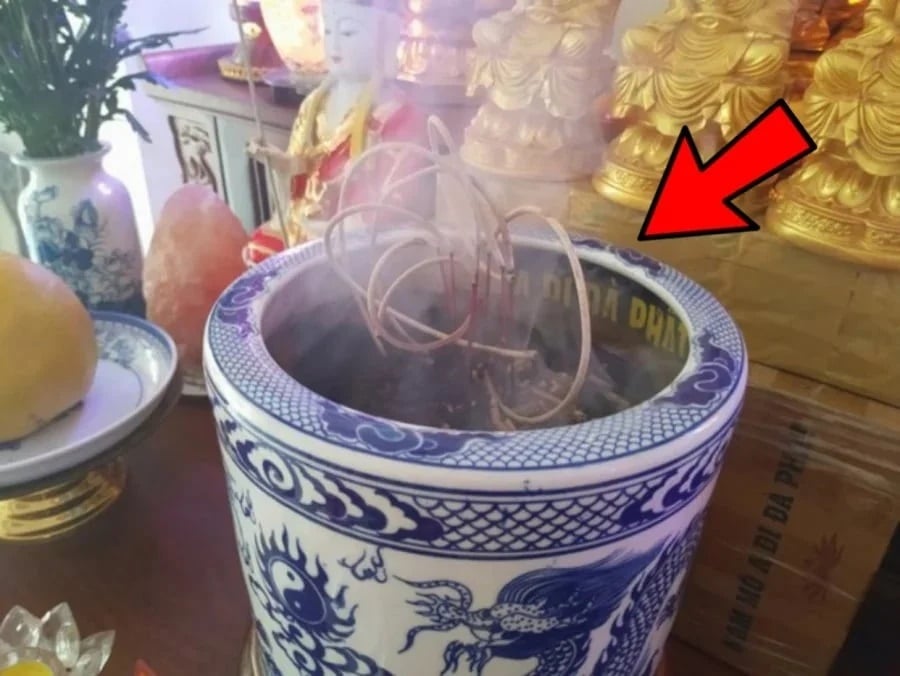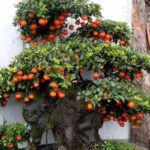## Signs That Your Ancestral Worship Bowl Needs to Be Replaced: For Long-Term Peace and Prosperity

When You See This Sign in Your Ancestral Worship Bowl, It’s Time for a Change: Holding On to It Will Only Bring Bad Luck
**1 – Ancestral worship bowl is misaligned or displaced:**
The primary criterion for placing the ancestral worship bowl is that it should be positioned neatly and centrally on the altar. If the bowl is not facing directly outwards towards the sun and the moon, or if it is significantly misaligned with the altar’s center, or if the incense sticks are crooked and bent, it is considered displaced.
Such misalignment is seen as an offense and indicates a lack of attention from the homeowner to the worshipped Gods, Buddha, and Ancestors. Additionally, a displaced ancestral worship bowl is associated with “disturbing the underworld,” which is a major taboo that can directly affect the peace and prosperity of the family and its members.
**2 – Ancestral worship bowl is tilted:**
Just like displacement, a tilted ancestral worship bowl can also be caused by external factors such as cleaning the altar. This is considered a major taboo as it can lead to “disturbing the underworld,” which is associated with bad luck and instability in the family’s finances and overall well-being.
**3 – Ancestral worship bowl contains impurities:**
For a long time, glutinous rice ash has been the preferred choice for cleaning ancestral worship bowls. This practice helps keep the bowl clean and creates a positive energy field for worship. In the Yin-Yang and Five Elements philosophy, the use of glazed ceramic ancestral worship bowls with glutinous rice ash represents the earth element, and in the cycle of generation, earth generates metal, which symbolizes wealth and prosperity for the family.
Some families use sand as an alternative, but it is crucial to be cautious and ensure that the sand is free from any impurities. According to a Feng Shui expert, altars, and ancestral worship bowls, in particular, are spaces dedicated to Buddha, Gods, and Ancestors (those who have passed away and belong to the underworld). Therefore, it is essential to maintain a calm and static environment.
In spiritual worship, every event or occurrence can be seen as a sign or an omen. Thus, it is important to remember to ask for permission from Buddha, Gods, and Ancestors by burning incense before making any changes or touching any objects on the sacred altar to avoid committing a major taboo.
**4 – Ancestral worship bowl catches fire:**
From a scientific perspective, the main reason for an ancestral worship bowl to catch fire is when someone in the family lights incense but fails to extinguish the flame completely. This can cause the fire to spread to other incense sticks and eventually ignite the entire bowl. The material used for the incense stick holders is dry and highly flammable, so even a small spark or ember can lead to a bowl fire.
According to folk beliefs, an ancestral worship bowl catching fire is a dangerous omen. It signifies bad luck and indicates that the homeowner may encounter difficulties and upheavals in the near future, warranting extra caution.
*Note: This article is for reference only. For specific cases, it is recommended to consult a Feng Shui expert or a professional in this field for more personalized advice and peace of mind.*
“The Hidden Significance of Succulent Plants in Feng Shui”
Succulents, or fat plants as they are sometimes affectionately known, are a popular choice for many gardeners and plant enthusiasts. These small, yet captivating plants boast an array of unique and beautiful leaves that set them apart from other flora. With their compact size and easy-going nature, they have earned a special place in the hearts of many, becoming a beloved addition to homes and gardens alike.
The Golden Treasure: A Rare Find for Abundance and Prosperity
Do you know of a houseplant that is considered a “family heirloom”, bringing luck and prosperity to the household? The Golden Orange Tree, or ‘Hong Da’ as it is often called, is this coveted plant. With its branches laden with golden, shimmering oranges, the Hong Da is an exquisite sight and a symbol of opulence and wealth.





































